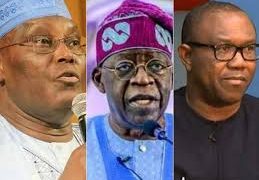The Supreme Court of Nigeria commenced hearing appeals challenging President Bola Tinubu’s electoral victory in the February 25, 2023 election. This high-stakes legal battle involves three prominent appellants: Atiku Abubakar of the Peoples Democratic Party (PDP), Peter Obi of the Labour Party (LP), and the Allied Peoples Movement (APM). Their goal is to nullify Tinubu’s victory and raise questions about the election’s legitimacy.
The proceedings unfolded on Monday, October 23, 2023, in the Supreme Court Complex in Abuja, the nation’s capital. The seven-member panel of judges, led by Justice Inyang John Okoro, presided over the hearings.
One of the central issues during the legal arguments was the authenticity of President Tinubu’s educational certificate. Reports indicated conflicting letters from Chicago State University (CSU) regarding the certificate’s validity, with one letter affirming its authenticity and another discrediting it. This certificate dispute became a focal point of contention during the hearing.
Despite the legal complexities, it’s crucial to understand the political significance of the Supreme Court’s role in this process. As the highest court in Nigeria, its decisions will shape the nation’s political landscape and influence the legitimacy of the election results. The appellants have presented their cases, seeking to persuade the court that irregularities, misconduct, or issues related to President Tinubu’s qualification justify the annulment of the election.
During the proceedings, pro-Tinubu youths held a protest outside the Supreme Court premises, reflecting the intense political passions and interests surrounding the case. The presence of such demonstrators underscored the significance of the court’s decision and its potential impact on the nation.
In the midst of the legal arguments, the Supreme Court’s Director of Press and Information, Dr. Festus Akande, emphasized that all seven members of the panel remained intact and ready to hear the petitions. This clarification came in response to erroneous reports that some judges had withdrawn from the case due to alleged internal issues within the apex court.
As the legal proceedings unfold, the nation awaits the Supreme Court’s judgments, which will have far-reaching implications for the political landscape, the rule of law, and the perception of electoral integrity in Nigeria. This high-profile case underscores the vital role of the judiciary in ensuring fairness and accountability in the electoral process.















